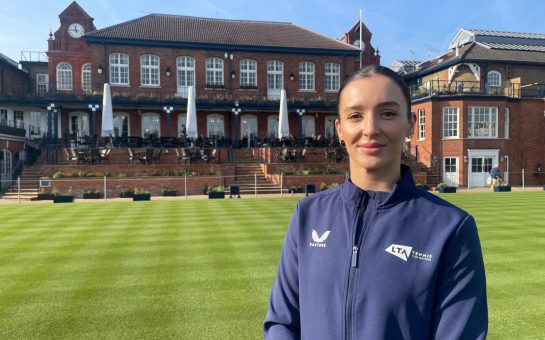Four British women have won the Wimbledon singles title since Fred Perry’s victory.

The British media has been criticised worldwide for the misconception that Andy Murray is the first British tennis player to win Wimbledon in 77 years.
In fact, unknown to the majority of the public, four British players have won Wimbledon since Fred Perry’s infamous win in 1936.
American feminist writer Chloe Angyal sparked the debate on Twitter, tweeting: “Murray is indeed the first Brit to win Wimbledon in 77 years unless you think women are people,” which has now been retweeted over 17,000 times.
I later asked her about her views on the perceptions of women’s tennis throughout the media and the general public.
She said: “Many people do say that men’s tennis is simply more interesting to watch, and I don’t know if that’s because they’re sexist or not; I can’t see inside their heads.
“But it has become quite clear this week, people who tend to say that also tend to believe that they don’t think that women’s tennis is “real” tennis.
“The view that there’s “tennis” and then there’s “women’s tennis,” like a ladies’ auxiliary or something, is so incredibly outdated.
Commenting on British media reports, Angyal said: “To say that Murray’s the first in 77 years is only bad journalism if you think that journalism should require being factually accurate.
“Those reports that he’s the first reflect what journalists, and a lot of readers, think about sports: men are the default, and women need a qualifier.”
Even the Lawn Tennis Association’s (LTA) website made the error, reading ‘British No.1 Andy Murray ended the 77 year wait for a British Wimbledon Champion.’
When I spoke to LTA’s communications director, James Munro, about the error, he said: “What do you want us to do about all this?”
British newspaper headlines yesterday included errors such as: ‘Andy Murray ends 77 years of waiting for a British Champion,’ from the Daily Mail, while the Times read: ‘Murray ends 77-year wait for British win.’
Dorothy Round Little won the tournament only a year after Perry, instantly putting to rest the idea that Britain had to wait 77 years, or even a year, to reclaim the title.
Partially deaf player Angela Mortimer won in 1961, followed by Ann Haydon-Jones in 1969 against tennis legend Billie Jean King.
Until Sunday, Virginia Wade was the last British player to win Wimbledon 36 years ago in 1977, although few even know who she is.
Some people have begun to criticise newspapers such as the Guardian for pointing out the errors in the first place.
Telegraph columnist Jonathan Liew said: “It’s a great newspaper. It’s just a shame they are now taking cheap shots at one another.
When pointing out to the Guardian that they had also made the same errors on their own website, he said: “See, it’s not very nice when someone accuses you of sexism, is it?”
Quick to back up the Telegraph, he said: “No errors were made on our front page. Wade was mentioned. And we made it clear twice that we were referring to a men’s champion.”
Chris Chase from USA Today said: “Most of this alleged bias comes from headlines, which is more about practicality than sexism. Headlines and soundbites can only be so long, so keeping them short and punchy is necessary. The body of the text is where the finer points are made.”
It is fair to say that tennis has set an example in recent years for gender equality within sports.
Wimbledon began offering women the same total prize money as men six years ago.
LTA’s Senior Media Manager John Dolan said: “From a National Governing Body perspective, tennis is a sport which is just as much for women and girls as for men and boys and one of the few sports that has a pretty equal gender divide.”
The decision on equal pay, which some thought was a little too late, was widely accepted, although some argued that if women were only expected to play three sets rather than five, then they should receive less in the form of pay.
As the National Governing Body continues to pave the way for gender equality within sport, the spotlight has turned to the media to remain fair and balanced.
But there is only so much they can do to in terms of public opinion when it comes to watching women’s tennis.
One Wimbledon fan said: “The women’s game never does get quite as much coverage, perhaps it’s because it’s bit lower quality.
“The points aren’t as long, they’re not as strong, so they can’t hit as far. I enjoy watching it, but you can’t deny men are physically stronger than women.”
Some would argue there is just not a British figure in women’s tennis as successful as Andy Murray at the moment.
The coverage on Britain’s Laura Robson this year was huge. Although she only made it to the fourth round, the 19-year-old is tipped to win her first grand slam in the next year or so.
It is role models like Robson which will encourage more women and girls to take up the sport, which the LTA has been fighting for even before Sport England threatened to pull its £10.3m award due to lack of young people’s participation and interest in tennis.
Although homegrown talents such as Robson are receiving more interest, it is British women over the past 77 years who have been holding the trophy for tennis.
Wimbledon resident Sophie Fowler said: “I think it’s outrageous that most of the country did not know who Virginia Wade was or the three other women.
“Someone in the media needs to address this before these tennis champions are erased forever.”
Photo courtesy of ncay, with thanks.
Follow us @SW_Londoner




